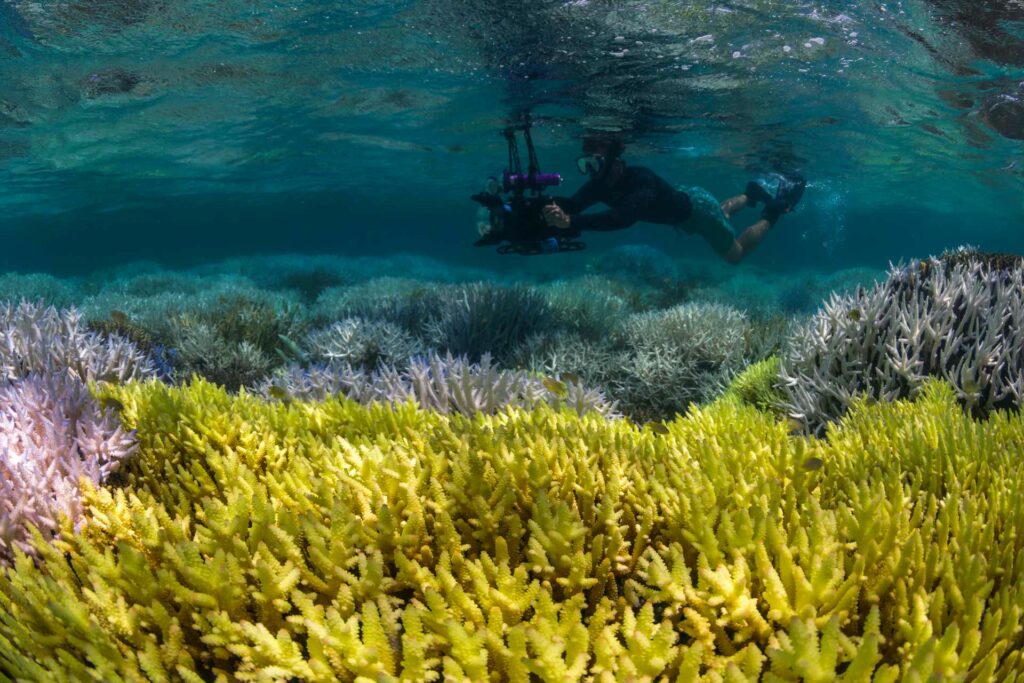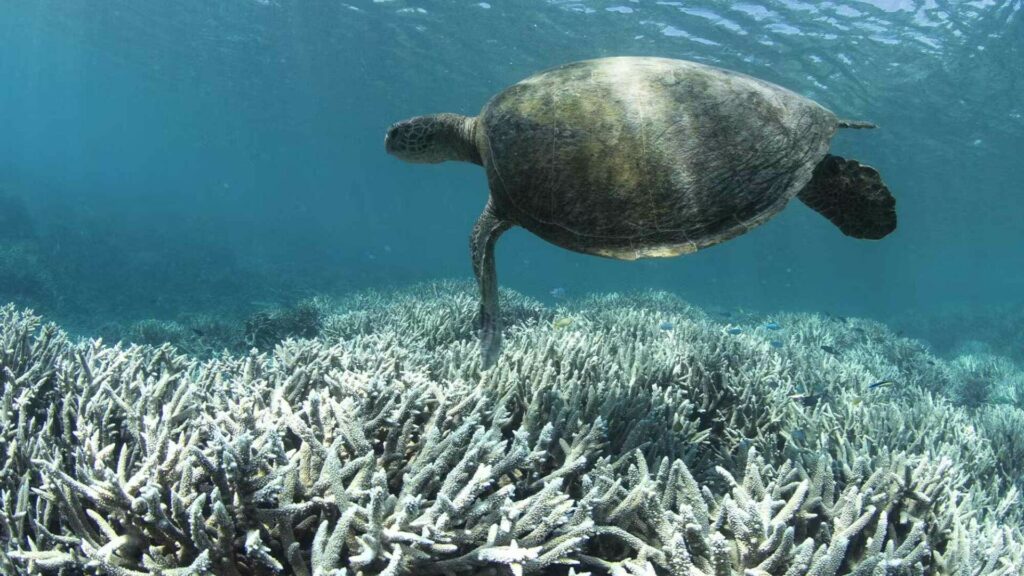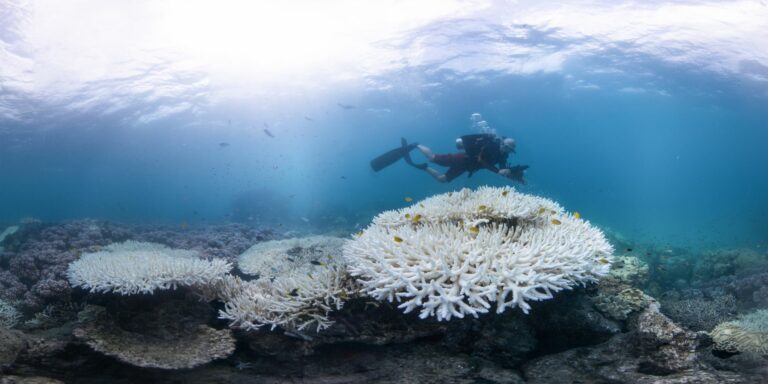The world is currently experiencing its fourth global coral-bleaching event, the second to have occurred in the past 10 years.
Scientists from the USA’s National Oceanic & Atmospheric Administration (NOAA) and International Coral Reef Initiative (ICRI) have issued a joint statement to announce that bleaching has now been confirmed in all the tropical oceans.
Bleaching-level heat stress, caused by prolonged increases in anomalous ocean temperatures, is described as remaining extensive across the Atlantic, Pacific and Indian Oceans, where it is being remotely monitored by NOAA’s Coral Reef Watch (CRW).
“From February 2023 to April 2024, significant coral-bleaching has been documented in both the Northern and Southern Hemispheres of each major ocean basin,” said CRW co-ordinator Dr Derek Manzello.
Mass bleaching of coral reefs must be confirmed within each ocean basin to finally determine a global event, but since early 2023 this state of affairs has been gradually confirmed in at least 53 countries, territories and local economies.

Affected have been the Red Sea, including the Gulf of Aqaba, the Persian Gulf and Gulf of Aden; Florida and the Caribbean; Australia’s Great Barrier Reef; the Eastern Tropical Pacific (including Mexico, El Salvador, Costa Rica, Panama and Colombia); and large areas of the South Pacific that include Fiji, Vanuatu, Tuvalu, Kiribati and the Samoas.
The most recent reports have confirmed widespread bleaching across parts of the western Indian Ocean, including Kenya, Mauritius, Seychelles and Tanzania; off Indonesia’s western coasts; and across parts of the south Atlantic, including north-eastern Brazil.
The last global bleaching event, which lasted three years and ended in mid-2017, was considered worse than the first two in 1998 and 2010.
“As the world’s oceans continue to warm, coral bleaching is becoming more frequent and severe,” says Manzello. “When these events are sufficiently severe or prolonged, they can cause coral mortality, which can negatively impact the goods and services coral reefs provide that people depend on for their livelihoods.”
In mitigation
If the stress driving bleaching diminishes, corals can still recover, say NOAA and ICRI, with reefs able to maintain their biodiversity and ecosystem functions. Because global bleaching events do not affect all coral reefs equally, they require a suite of global, regional and local interventions.
ICRI, a partnership of 101 international members currently co-chaired by NOAA and the US Department of State, develops and shares best practices for effective management of coral reefs through implementation of its Plan of Action.
NOAA says it has incorporated such resilience-based management practices, with increased emphasis on coral restoration, into its 2018 strategic plan, and funded a National Academies of Sciences study that led to publication of its 2019 Interventions To Increase The Resilience Of Coral Reefs.
The unprecedented 2023 heatwave in Florida started earlier, lasted longer and recorded higher temperatures than any previous event in the region, and NOAA says that by deploying these interventions it succeeded in offsetting some of the negative impacts on Florida’s corals.
Measures it employed included transferring coral nurseries to deeper, cooler waters and deploying sunshades to protect corals in other areas.
Networks such as the Global Coral Reef Monitoring Network, an operational network of ICRI and the US Coral Reef Task Force, provide mechanisms for reporting on the impact of bleaching on the world’s coral reefs, alongside regional bleaching observation networks.
Even the deep reefs
“I am saddened but not surprised by the declaration of a fourth global coral-bleaching event,” commented ichthyologist Dr Luiz Rocha, co-director of the California Academy of Sciences (CAS)’s Hope for Reefs initiative.
 California Academy of Sciences)" class="wp-image-61411" title="4th global bleaching confirmed - as Rocha finds ghost corals at 60m 2" srcset="https://divernet.com/wp-content/uploads/2024/04/Luiz-Rocha-300x197.jpg 300w, https://divernet.com/wp-content/uploads/2024/04/Luiz-Rocha-768x505.jpg 768w, https://divernet.com/wp-content/uploads/2024/04/Luiz-Rocha-1024x673.jpg 1024w, https://divernet.com/wp-content/uploads/2024/04/Luiz-Rocha-1320x868.jpg 1320w, https://divernet.com/wp-content/uploads/2024/04/Luiz-Rocha-1536x1010.jpg 1536w, https://divernet.com/wp-content/uploads/2024/04/Luiz-Rocha.jpg 1920w" sizes="(max-width: 1024px) 100vw, 1024px">
California Academy of Sciences)" class="wp-image-61411" title="4th global bleaching confirmed - as Rocha finds ghost corals at 60m 2" srcset="https://divernet.com/wp-content/uploads/2024/04/Luiz-Rocha-300x197.jpg 300w, https://divernet.com/wp-content/uploads/2024/04/Luiz-Rocha-768x505.jpg 768w, https://divernet.com/wp-content/uploads/2024/04/Luiz-Rocha-1024x673.jpg 1024w, https://divernet.com/wp-content/uploads/2024/04/Luiz-Rocha-1320x868.jpg 1320w, https://divernet.com/wp-content/uploads/2024/04/Luiz-Rocha-1536x1010.jpg 1536w, https://divernet.com/wp-content/uploads/2024/04/Luiz-Rocha.jpg 1920w" sizes="(max-width: 1024px) 100vw, 1024px">On 2 April Rocha completed the first-ever set of scientific dives to as deep as 152m in Australia’s Coral Sea, and says that the NOAA / ICRI announcement was “very consistent” with his diving experiences.
“During my trip last month to the Coral Sea and Great Barrier Reef, I saw corals bleaching all the way down to 60m,” he says. “This was one of the deepest records of bleaching and is very concerning, because many people thought deep depths could be a refuge for corals.
“It was also very concerning that in the shallows we saw bleaching in corals of all sizes, from juvenile to adults, indicating that this event is killing corals of all ages.
“This fourth global coral bleaching is a loud and urgent call to action that we must take steps immediately to address climate change at all levels, from the personal level to within our local communities to national and international policies to reduce fossil fuel use and emissions.
“We look forward to working with scientists around the world, including the Great Barrier Reef Foundation in Australia, to provide critical monitoring of coral reefs and develop on-the-ground solutions to protect reefs that are most at risk.”

“One of the best ways to assess the impact of a bleaching event is to track changes to a reef over time,” commented Alexandra Dempsey, CEO of the US-based environmental organisation Khaled bin Sultan Living Oceans Foundation (KSLOF).
“Reliable baseline data on the state of the reef – such as the data on coral cover, fish biomass and species diversity we collected on the foundation’s Global Reef Expedition – can help scientists assess the impact of the bleaching event and understand how the health of a reef changes over time.”
ICRI’s Coral Bleaching Hub is designed to share key messages and resources and encourage global co-operation. ICRI is hosting a webinar on 14 May to discuss the 4th Global Bleaching Event – register here.
Also on Divernet: 90m down: Coral bleaching is cutting deep, What will it take for coral to survive?, Bleaching affects fishes’ ability to ID predators, Remote Pacific coral reef shows some ability to cope with ocean warming

